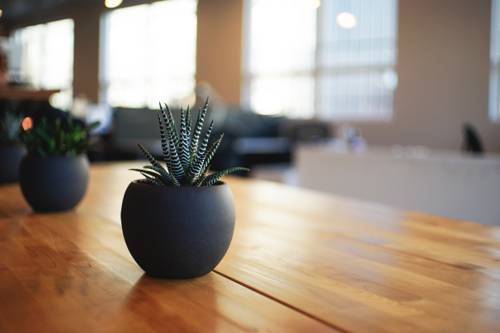
FAQ About Best Indoor Plants for Office or Workspaces

What are the best low-maintenance indoor plants for an office?
Some of the best low-maintenance indoor plants for an office include the Snake Plant, ZZ Plant, and Pothos. These plants are hardy, require infrequent watering, and can thrive in a variety of light conditions, making them ideal for busy office environments.

How do indoor plants improve air quality in a workspace?
Indoor plants can improve air quality by absorbing pollutants through their leaves and roots. They are capable of removing toxins such as formaldehyde, benzene, and trichloroethylene from the air. Additionally, plants increase humidity levels, which can make breathing easier.

Which indoor plants are best for low-light office environments?
For low-light office environments, consider plants like the Peace Lily, Snake Plant, and Cast Iron Plant. These plants do not require direct sunlight and can adapt to lower light conditions, making them suitable for offices with minimal natural light.

Can indoor plants help reduce stress at work?
Yes, indoor plants can help reduce stress. Studies have shown that having plants in a workspace can reduce stress levels, improve mood, and enhance overall productivity. The presence of greenery can create a calming environment, helping employees feel more relaxed.

What is the easiest way to water office plants?
The easiest way to water office plants is to create a schedule based on the needs of each plant type. Use a watering can with a spout to avoid spills and ensure even distribution. Alternatively, self-watering pots can be used to maintain consistent moisture levels.

How do I choose the right indoor plant for my office space?
To choose the right indoor plant for your office, consider the light conditions, available space, and your ability to care for the plant. Also, think about the aesthetic you want to achieve. Research the specific needs of the plants you are considering to ensure they will thrive in your environment.

Are there indoor plants that can reduce noise levels in an office?
Yes, some indoor plants can help reduce noise levels by acting as natural sound absorbers. Plants with thick leaves, such as the Rubber Plant and Ficus, can dampen sound by reflecting and refracting noise, making them suitable for open-office settings.

Do indoor plants need artificial lighting in office environments?
While many indoor plants can thrive with natural light, some may benefit from artificial lighting, especially in windowless offices. LED grow lights are a good option as they provide the required spectrum for photosynthesis without overheating the plants.

What are the best indoor plants for improving concentration and productivity?
Plants like the Snake Plant, Peace Lily, and Lavender are known to improve concentration and productivity. They enhance air quality, reduce stress, and add a touch of nature, which can boost mental clarity and work efficiency.

How often should I fertilize indoor office plants?
Fertilizing indoor office plants should be done every 4-6 weeks during the growing season, typically from spring to fall. Use a balanced, water-soluble fertilizer and follow the manufacturer’s instructions to avoid over-fertilization.

Which indoor plants are safe for offices with pets?
If your office is pet-friendly, consider pet-safe plants like Spider Plants, Boston Ferns, and Areca Palms. These plants are non-toxic to cats and dogs, making them suitable choices for spaces where pets may be present.

Can indoor plants help with allergies in an office?
Certain indoor plants, such as the Peace Lily and Bamboo Palm, can help reduce allergens by trapping dust and other particles. However, it is important to regularly clean and maintain the plants to prevent them from becoming a source of allergens themselves.

What are some aesthetically pleasing plants for a modern office?
For a modern office, consider plants like the Fiddle Leaf Fig, Monstera, and ZZ Plant. These plants have striking leaf shapes and sizes that can enhance the decor and complement contemporary design elements.

How do I know if an office plant is getting too much or too little water?
Signs of overwatering include yellowing leaves and wilting, while underwatered plants usually have dry, crispy leaves. It's important to feel the soil moisture before watering and adjust the frequency according to the plant's specific needs.

What are the best air-purifying plants for the office?
Air-purifying plants like the Spider Plant, Peace Lily, and English Ivy are excellent for office environments. They can effectively filter out common indoor air pollutants, improving the overall air quality.

Can indoor office plants survive without sunlight?
While no plant can survive indefinitely without light, some, like the Snake Plant and ZZ Plant, can survive for extended periods in low-light conditions. It's advisable to provide some light, natural or artificial, to maintain plant health.

How do I prevent pests on indoor office plants?
To prevent pests, regularly inspect your plants for signs of infestation. Use insecticidal soap or neem oil for treatment, and ensure good air circulation around the plants. Avoid overwatering and keep the leaf surfaces clean to reduce pest attraction.

Are succulents good for offices?
Succulents are excellent for offices due to their low maintenance needs. They require infrequent watering and can thrive in well-lit environments. Popular choices include Aloe Vera, Jade Plant, and Echeveria.

What is the role of humidity in caring for office plants?
Humidity plays a crucial role in plant health by affecting transpiration and nutrient uptake. Many tropical plants prefer higher humidity levels, which can be achieved with regular misting or using a humidifier, especially in dry office environments.

Can indoor plants help in reducing indoor pollutants?
Yes, indoor plants can reduce pollutants by absorbing chemicals through their leaves and soil processes. NASA's Clean Air Study found that certain plants can remove volatile organic compounds from indoor spaces, contributing to cleaner air.
